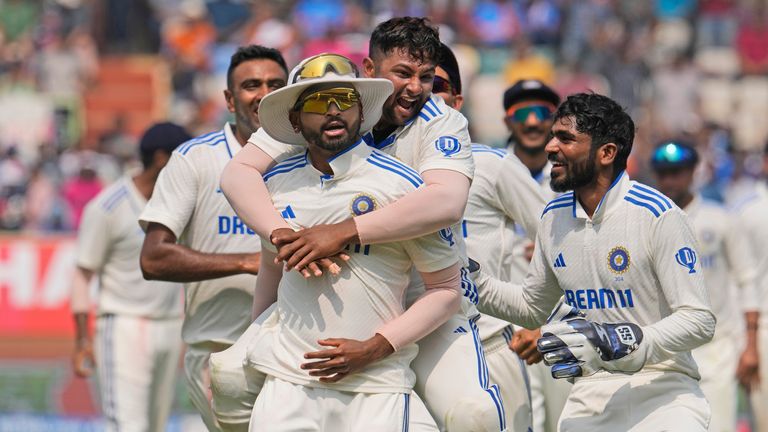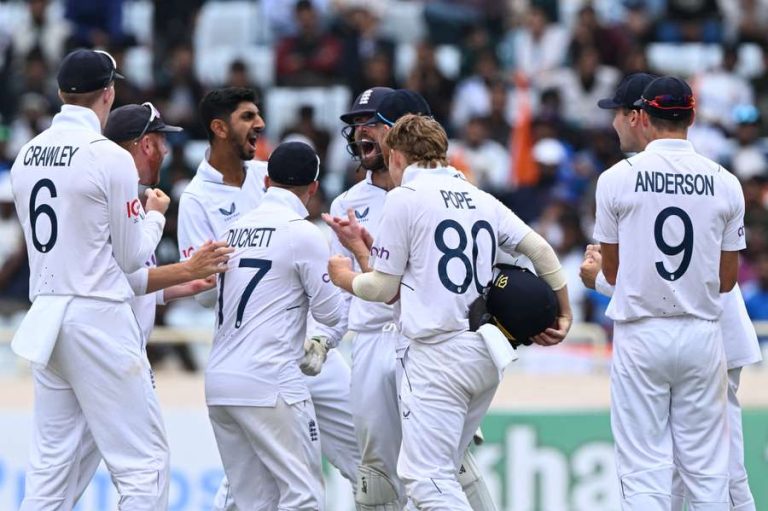England vs. India: The hosts win in Visakhapatnam by 106 runs to tie the series
The second Test between India and England in Visakhapatnam ended in a victory for the hosts, resulting in a leveled series at 1-1. England, facing a challenging target of 399 runs, fell short and were bowled out for 292 on the fourth day of the match.
Despite a promising start that saw England reach 95-1, the tides turned when Rehan Ahmed was dismissed leg before wicket by Axar Patel, triggering a consistent fall of wickets. Opener Zak Crawley’s resilient innings of 73 provided a glimmer of hope for England, but when he was given out lbw to Kuldeep Yadav upon review, the game slipped away.
Captain Ben Stokes, seen as a potential game-changer, fell victim to a run-out by Shreyas Iyer, diminishing England’s chances. With 179 runs required and only three wickets remaining, India could breathe a sigh of relief.
A partnership between Ben Foakes and Tom Hartley delayed India briefly, with Hartley surviving reviews that could have given Ravichandran Ashwin his 500th Test wicket. However, fast bowler Jasprit Bumrah took a return catch off Foakes, and Shoaib Bashir’s dismissal left Ashwin on the verge of the milestone.
Bumrah, finishing with three wickets in the innings and nine in the match, uprooted Hartley’s off stump, leaving Ashwin on 499 wickets as England succumbed to defeat. The series now heads to the third Test in Rajkot on February 15.
An excessive measure for England
Despite England’s commendable performances in parts of the series, especially their bowling display after losing the toss, a collapse of 6-68 in their first innings proved decisive. England, known for their ability to chase big fourth-innings targets, faced a monumental task that ultimately proved too challenging.
As England regroups during the break in Abu Dhabi, they will hope for the recovery of Joe Root’s finger injury and an improvement in Jack Leach’s knee condition. Despite the defeat, England sees the upcoming Tests as an opportunity, recognizing the difficulty posed by the Indian team but remaining optimistic about their chances in the remaining matches.
As the sun set on Sunday evening, a sense of optimism pervaded the England camp, with James Anderson expressing the team’s ambition to chase down their target within 60 or 70 overs on Monday. Starting the day at 67-1, England’s pursuit began on a positive note, with Zak Crawley impressively driving Jasprit Bumrah and Rehan Ahmed taking on Axar Patel.
India, seemingly on the defensive, created opportunities for England to score, but Ahmed’s miscalculation in playing back to Axar swung the momentum in the host’s favor. The debate arises over whether England’s aggressive approach teetered into recklessness, with only Joe Root’s dismissal being deemed somewhat ugly. Root, possibly affected by a finger injury, displayed a skittish disposition, playing a wild shot at Ravichandran Ashwin and getting caught at point.
Crawley showcased his batting prowess, securing his second half-century of the match, only to be unlucky in falling lbw to Kuldeep Yadav’s fifth delivery of the day after a review. Jonny Bairstow faced the wrath of Bumrah just before lunch, being adjudged lbw.
Despite Ben Stokes settling in, his dismissal unfolded in peculiar fashion. A miscommunication with Ben Foakes led to Stokes being caught short by a direct hit from Shreyas Iyer at mid-wicket. Foakes and Tom Hartley demonstrated resilience, with Ashwin’s pursuit of his 500th Test wicket extended.
Jasprit Bumrah, with his sensational skill, dismissed Foakes with a well-executed slower ball. Mukesh Kumar, the first seamer other than Bumrah or Anderson to take a wicket in the series, further tilted the balance in India’s favor. The stage was then set for Ashwin, but Bumrah swiftly dismantled Hartley’s defenses with a crafty delivery.
India’s comeback in the match showcases resilience, particularly considering the absence of five first-choice players. Young batters, Yashasvi Jaiswal and Shubman Gill, have been pivotal contributors, with the latter displaying determination with a hundred in the second innings.
The formidable Jasprit Bumrah has emerged as England’s primary tormentor, with his ability to move the ball at high pace posing a significant challenge for the tourists. As the series enters a brief break, England faces the crucial task of devising strategies to counter Bumrah’s exceptional skill.
India, buoyed by a proud home record of not having lost a series in the country for 12 years, remains the favorite despite England’s commendable performance in the first two Tests. The return of all-rounder Ravindra Jadeja and batter KL Rahul from injuries could further bolster the home side, but uncertainties loom over Virat Kohli’s participation, who has been absent for personal reasons in both the Hyderabad and Visakhapatnam Tests.
The intriguing battle between England and India is poised for its next chapter, with the break providing both teams an opportunity to reassess strategies, regroup, and potentially welcome key players back into the fold. The twists and turns of Test cricket continue to captivate, and as the series progresses, the narrative promises to unfold with new challenges and defining moments.
In a post-match interview with TNT Sports, England captain Ben Stokes expressed his confidence in the team’s ability to chase down the target in the last innings. Despite ending up on the wrong side of the result, Stokes commended the team’s approach in taking on the challenging task, emphasizing their resilience and belief in their capabilities. He congratulated India on the victory, acknowledging it as another great game.

On the other side, India captain Rohit Sharma recognized the tough challenge posed by England, acknowledging their recent strong performances in cricket. While pleased with the win, Sharma highlighted the ongoing difficulty of the series.
Jasprit Bumrah, named Player of the Match, expressed his joy at contributing to the team’s success, emphasizing the satisfaction of the victory.
Former England spinner Phil Tufnell noted England’s commendable display of resilience and fight but acknowledged the superior performance of India’s bowlers, describing them as being too good and proving to be a formidable force.
In a remarkable display of batting prowess on Monday, New Zealand’s Rachin Ravindra extended his exceptional run in international cricket by smashing his maiden double-century, propelling the Kane Williamson-led side to a massive total in the first innings against South Africa. The Test series opener at Mount Maunganui’s Bay Oval saw Tim Southee and his teammates amass a formidable 477-7 in 141.3 overs by Tea.
Continuing his impressive form from the previous day, Ravindra, the talented all-rounder, carried his overnight score of 118 into Day 2 and effortlessly surpassed the 150-run mark, asserting New Zealand’s dominance in the series opener. The partnership between former New Zealand skipper Williamson and Ravindra was proving to be a marathon, steering the hosts to 271-3 in 94.5 overs.
However, the breakthrough for South Africa came when Ruan de Swardt dismissed the experienced Williamson, claiming his maiden Test wicket at the Bay Oval. Despite Williamson’s departure after a splendid knock of 118 off 289 balls, Ravindra seized the opportunity to etch his name into New Zealand’s cricket history.
In the second session, Ravindra showcased his batting prowess by taking a single to point off South Africa skipper Neil Brand, reaching the milestone of his first-ever double-century in Test cricket. His innings not only marked a personal triumph but also set a new benchmark for New Zealand’s maiden Test century-makers. Ravindra’s score surpassed the previous record held by Mathew Sinclair, who scored 214 in 1999. Remarkably, Ravindra now joins an elite group as the fourth New Zealand batter to convert a maiden Test century into a double century.
The significance of Ravindra’s achievement resonates not only in his individual success but also in the broader context of New Zealand’s cricketing history. His masterful innings adds to the growing legacy of outstanding performances by Kiwi cricketers, showcasing the depth of talent in the team.
As Ravindra’s bat did the talking, his innings became a testament to the resilience and skill embedded in New Zealand cricket. The team’s ability to produce players capable of making significant contributions, especially in crucial Test matches, underscores the growth and evolution of New Zealand as a force to be reckoned with in international cricket.
The series opener against South Africa not only serves as a platform for individual achievements but also sets the tone for the overall competitiveness of the Test series. New Zealand, with Ravindra’s monumental innings, sends a clear message to their opponents about their strength and depth in the batting department.
As the cricketing world applauds Rachin Ravindra’s historic double-century, the focus now shifts to the continuation of the series and the potential for further remarkable performances. The Kiwi all-rounder’s feat adds an exciting chapter to the ongoing Test battle, emphasizing the unpredictability and excitement that Test cricket brings to fans worldwide.
Rachin Ravindra played a pivotal role in guiding the New Zealand cricket team to a formidable total of 511 runs in the first innings against South Africa. The 24-year-old emerged as the standout performer during the ICC World Cup 2023 held in India, achieving centuries against England, Australia, and Pakistan. Recognized as the emerging player of the 2023 season by the International Cricket Council (ICC), Ravindra showcased his talent by completing a double century in 340 balls. His entertaining innings against South Africa included 21 fours and one six. Despite facing challenges in securing a Test berth for over two years prior to the series against South Africa, Ravindra’s remarkable performance contributed significantly to New Zealand’s strong position in the match. In the lead-up to the series opener, the young all-rounder played only three games, managing to score 73 runs in six innings.







